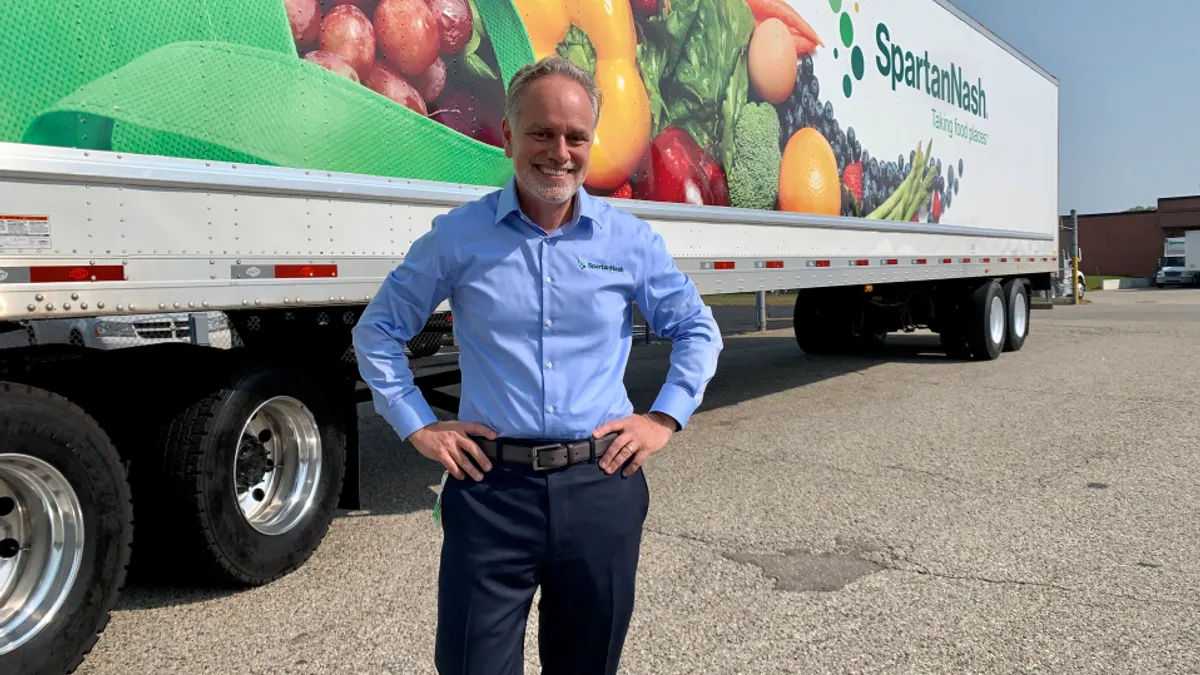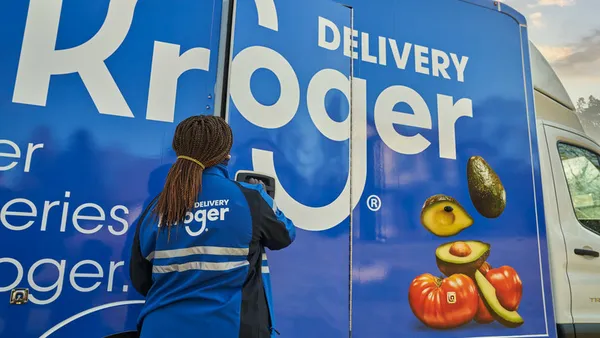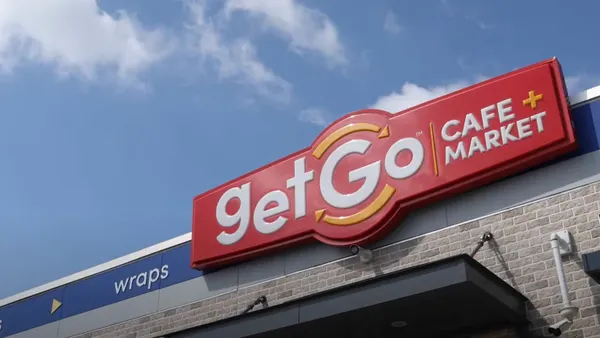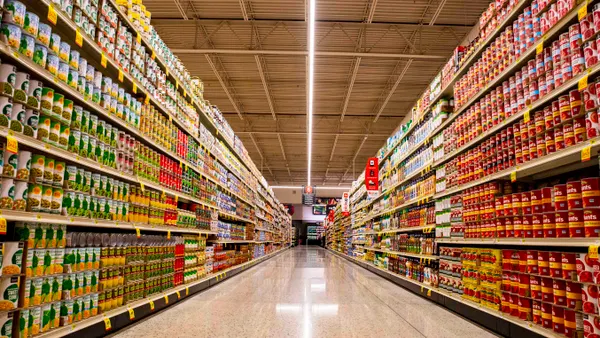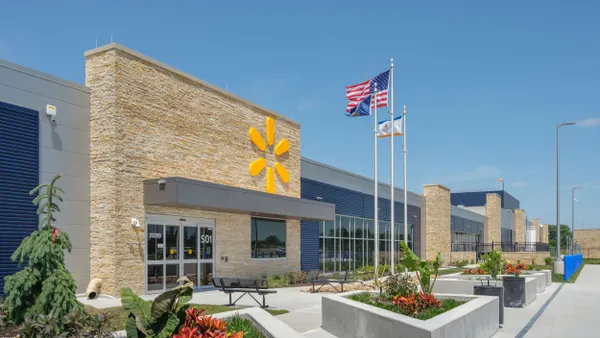Tony Sarsam took the reins at SpartanNash in the middle of the global pandemic. That meant the chief executive, who previously led an embattled Borden Dairy to an acquisition, had to hit the ground running even faster than a new CEO typically would.
But it didn’t prevent him from swiftly laying the foundation for the company’s future. In several months’ time, SpartanNash has named a raft of new appointments across top positions, including chief financial officer, chief supply chain officer, chief strategy officer and board chairman.
That rapid onboarding has become something SpartanNash now actively promotes. And it heralds transformative change for a company whose stock price has struggled to gain momentum in recent years. In an interview with Grocery Dive, Sarsam said getting the right leadership in place quickly at SpartanNash has a trickle-down effect through the company, with top executives able to hire great store leaders, who in turn hire top-notch cashiers, baggers and warehouse associates.
“To build that future for our company right now, we have to be bold,” he said.
Hiring at the store and warehouse level is proving difficult in a tight labor market, however, and that’s testing Sarsam’s ability to create the “people-first” company he envisions. He’s also fighting on two fronts at SpartanNash, which operates a distribution as well as retail division. The former is undergoing significant updates to improve efficiency, while the latter, a network of more than 150 stores under hometown brands like D&W Fresh Market and Martin's Super Markets, is contending with the numerous demands of a suddenly elevated digital business.
Asked about his ultimate vision for the retailer/wholesaler, Sarsam said he’s excited by the many different directions the company could take, from acquisitions to expansion into new geographies, but that it all starts with his top goal for 2021: getting the right talent in place.
“There's a lot of different directions we can go, but every direction is going to depend on having great people,” he said.
This interview has been edited for length and clarity.
GROCERY DIVE: What was it like taking over a major food company in the middle of a pandemic? What was the biggest challenge you faced?
TONY SARSAM: My style in getting started depends on meeting people and being visible. But as I got started, there was nobody here. In an office that holds 600 people, there might have been four on opening day. That was challenging, but the upside was that the vast majority of the people who work at SpartanNash came to work every day. They worked in our warehouses and in our grocery stores, and I made sure to make those connections right away.
I also had to learn how to lead in a publicly traded environment. While I’ve spent the vast majority of my career in publicly traded companies, I’ve only been CEO of private companies. So there’s a bit of learning in that. The business had really terrific execution during the pandemic, and our folks never missed a beat in making sure communities got the supplies they needed, but we were in response mode in terms of labor and in getting our hands on supplies like toilet paper. While I think we did an admirable job, it was response mode, and that came with some exposures and some things that were not favorable in terms of our overall supply chain.
What’s behind all of these new top-level appointments at the company?
I set out some basic elements of our early mission, and the No. 1 goal early on was to create a future that includes a focus on people-first and on having great talent and great people in the organization. It’s a mindset of, "We're going to be a talent machine and we're going to grow the business." And not all those elements were embedded here when I started. There were some capability gaps, and there were roles that just didn’t exist here.
For example, we didn't have a laser-focused safety expert on the team. And I thought that was really important in making a statement about being people-first. You have to make a stand and show you really care about worker safety. That was a void, and so I brought on Greg Molloy to be our head of safety.
You have to move fast, and we've moved pretty fast. To build that future for our company right now, we have to be bold.
How important is having the right executives in place to achieving your long-term goals at SpartanNash?
It's critically important. I believe that for companies to have great cultures and great talent, they have to build it from the ground up. You find it in those entry-level positions and the first-line supervisors in your organization. But the paradox is, it’s very difficult to get there if you don’t have great leaders at the top. The CEO can’t do that by himself or by herself. I bring on new leaders who I believe can then bring on other new leaders that can bring on and train people and create a vision for the type of talent that we're going to have and the kind of culture that we're going to create here.
You spoke about frontline talent, which has become a major challenge for grocers and wholesalers lately. What are you seeing in the labor market and how is SpartanNash responding?
A tough situation got a lot tougher due to the pandemic. But I said [during our recent earnings call] that it’s our intention to win the war on talent. We’re not going to sit here and admire the problem or complain about it — we’re going to get right at it and make sure we have a great offering.
We’re increasing pay for our entry-level positions across the company. We typically do that in the spring in retail and in the summer for supply chain. We gave retail workers between 10% and 11% pay increases on those entry-level wages. That’s a significant step, but it’s not the last step. The whole offering has to include things like competitive benefits.
One of the other things we're working very hard on is to make sure that the roles we offer to people are understandable and predictable in their nature. Schedules in this industry can be notoriously variable, and we prefer to be able to get to a place where those schedules are more consistent. That helps people plan their lives, it helps build confidence and helps build the right kind of family and environment we want to have in our work as well.
What’s the biggest strength you see in the distribution business right now, and what do you see is the greatest challenge facing it?
The greatest strength is we have a long history of great expertise in that business and that includes serving our own retail stores, our independent customers and a couple of national customers. The challenge is that it's inherently a competitive industry. It's not a high-margin business, and we need to continue to invest in the tools that will make us more efficient and more effective.
Can you say more about what those measures will be? Does automation play a role?
Right now it will include very little in terms of automation. It's more process work. There's some [information technology] work that will be implemented. For example, we'll be looking at a new management system to help refine the effectiveness and efficiency of our transportation systems. There's going to be a lot of processes around warehouse arrangement, and that comes in the form of laying out the work, in terms of how we challenge people in their individual jobs, how we keep track of our progress and manage best practices from one building to another.
Amazon is one of your customers, and they raised eyebrows in the industry last year when they forged a commercial agreement with SpartanNash. What can you say about Amazon's growth plans?
We're super excited about Amazon. It's a great step for us to have that kind of partnership. Amazon is growing, they are serving the end-user in the way the end-user wants to be served. Our partnership with them, we believe, will help us to grow as they grow in this space. We think there's a lot of growth opportunities in food and food being delivered through the Amazon model.
How can SpartanNash, which operates regional grocery stores, keep up with the major industry players like Amazon in e-commerce?
If we go back 15 years ago or so, the notion was that people were really going to want their groceries delivered to their homes. And curiously, that has not manifested yet. The vast majority of people who want to use an e-commerce solution want click-and-collect instead of delivery. Compared to the larger grocers, we’re more of a neighborhood store. We’re going to be in more small communities, and we'll be in closer contact with folks in suburban and, even in some cases, urban areas. I think that’s the way we win.
We're a local guy offering that local service. We're also counting on our customers using the products that we sell exclusively in our store, like our own brands and like some of our fresh products. Our own brand sales are higher — significantly higher — in our e-commerce channel than they are among people coming and shopping the store directly. So I think people do have a connection with our stores, with our brands, and when they buy online, they buy a bigger basket of goods and they buy more things that are unique at our SpartanNash banners.
Where does SpartanNash stand in terms of private label penetration, and where would you like to be?
We are in the neighborhood of about 20% penetration with our own brands. We think that the folks who have a broad offering that's similar to ours and are the best at that are probably closer to 30%. I think that we can get there — that's our broad target over time.
What's your outlook on consumer spending long-term at grocery stores at this point?
There’s a chart that tracks about 70 years of people shifting from eating at home to eating in restaurants. I don’t expect that’s going to reverse itself because we had a pandemic. People will go back to restaurants, and they’re trickling back in right now. We’re looking at and asking, "What are the really sticky habits?" I think e-commerce is one. That’s convenient for a lot of people and will continue to grow.
I also think there are things about eating at home that people missed. Our seafood sales took off and were sometimes double what they were before the pandemic, and we have very thorough feedback from our customers saying that [preparing it] wasn’t hard. So people are going back to their old habits for the most part, but with some permutations, and it’s our job to figure out what those are.
Have there been any lessons SpartanNash learned during the pandemic about how to do a better job with meal merchandising? Grocery stores were fulfilling three meals a day for a lot of people.
One of the areas in the store that got beat up early in the pandemic was the deli. You think about it, it's food you can see being prepared or scooped into containers. We had to find a way to offer that back, so we started packaging it. People had a notion that it was freshly prepared but it wasn't exposed to the environment. That stuff really took off, and I think those things like fresh-cut fruits and vegetables, some seasoned meats and things like that will stay around.
You've said in the past that your previous chief executive roles have all involved company turnarounds. Do you believe that you're in the same position with SpartanNash?
I think the turnaround mentality is helpful. The way to think about it is that every business is in a turnaround. You’re always turning it around to whatever the next growth phase is. Some cases are more dire than others because profitability is really being challenged. I don’t think we’re the most dire case here, but we’re heading in a new direction, and we’re in a competitive industry. I like to think of every business as being always in that turnaround because it helps accelerate and bring urgency to what you do next and makes sure your business continues to grow.



